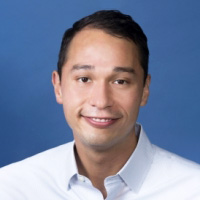Erik Dreaden, PhD is an assistant professor in Emory’s department of pediatrics and department of biomedical engineering, a shared department between Emory and GA Tech. The Dreaden Lab has been working hard to create an exciting light-responsive immunotherapy technology. This unique technology works to target cancer cells using light.
The goal of this developing technology is to improve current cancer therapies and immunotherapy. Dreaden’s interest in the field of cancer grew over time, as cancer has been a large part of his life. His father battled melanoma and colon cancer, so it has personally impacted his work and touched him.

Erik Dreaden, PhD
Dreaden’s motivation has also been shaped by visiting the children’s hospital and seeing kids with cancer. As he states, “What keeps me motivated is seeing how underserved kids with cancer truly are. There is a tendency is to think children’s cancers are small adult cancers. However, they are completely different sets of diseases and come with more profound side effects. Having proximity to patients in need helps to amplify motivation on a daily basis.”
When it comes to failure in research he approaches failure with a sense of optimism. “Failure is a part of everyday life as a researcher. In fact, I tell my students that I believe that the vast majority of science and engineering researchers will face failure. The ability to take that failure and move forward is what differentiates good scientists and engineers from great scientists and engineers. Every day, within the research field, you become more humiliated. Whether that be of a random chance or human error – for instance, you didn’t put a cap on something. Individuals who take failure personally, like me, can feel upset. But the other side of the coin is when you are personally invested in the research – that internal motivation keeps you going after that failure. It is a matter of moving the field forward, personal interest motivation, and patients that keep you going.”
When Dreaden began graduate school, he found a mentor and advisor and began to ask the question: “Can we use nanoscale materials to maximize therapeutic potential?” “My PhD advisor Mostafa El-Sayed is a tremendous person. Someone you look at and aspire to be as fulfilled in their work as they are – he is always enthusiastic and positive as he could be. He is someone I have always really admired and learned a tremendous amount from. Another inspirational person in my life is Paula Hammond at Massachusetts Institute of Technology (MIT) and she was the kind of person that you can always depend on anytime of day. You could call her, and she would drop everything to help someone on the team. Having optimistic, dependable, and enthusiastic individuals is essential. When I try to build a team, I think about my mentors and what qualities I look for.”
Given the impact of my mentors on my professional life I give special attention to creating the team in my lab. The medical fellows and postdoctoral fellows in the lab are integral part of the daily research. In his lab, medical fellows play a critical role. Their ability to move laterally is extremely beneficial to the lab. “We have a fantastic medical fellow, one from hematology, and that individual can move from the clinic to the lab, back and forth in one day. The exciting part is that they are in the middle of treating patients with a standard of care, then going to technology to where we hope the technology can surpass that standard of care. Being able to communicate with patients and say, ‘Hey this is what working with and this is what is possible from clinical trials.’ Not to mention, applying the knowledge and data towards their own work and coming to the lab to help de-risk this technology and make it more attractive. “
Another incredible asset to the research team is the post-doctoral fellows. The post-doctoral fellows bring in diverse perspectives and have a great foundation in biology. “Our postdoctoral fellows bring in diverse perspectives. I almost always try to make it a point to hire people from different backgrounds as well as basic science backgrounds because our work is so applied and so outcome focused.”
Dreaden’s view on his own personal success are humble. “I think people that know me, know that I am an intensely forward-looking person to a fault. The fault being, that I think reflection is important too. I am always thinking of the future, rather than thinking of what I have done successfully in the past. The most exciting part of this work is the things we have not done yet.”
Erik Dreaden: https://winshipcancer.emory.edu/bios/faculty/dreaden-erik.html